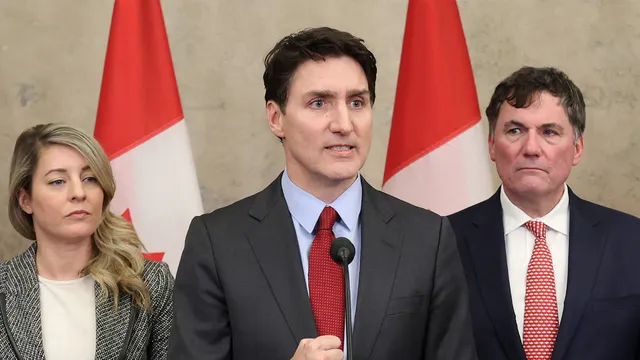
Justin Trudeau admits Trump's annexation threat is real
2025-02-10 03:45- Prime Minister Justin Trudeau acknowledged that Trump might be serious about annexing Canada for access to natural resources.
- The comments, overheard during a private meeting, indicate a shift in perception regarding Trump's intentions.
- This incident highlights ongoing tensions in Canada-U.S. relations focused on trade and resource management.
Express your sentiment!
Insights
In Canada, Prime Minister Justin Trudeau was caught on a hot mic during a closed-door session with business and labor leaders on February 7, 2025, where he remarked that President Donald Trump's idea of making Canada the 51st U.S. state is a 'real thing.' Trudeau expressed concern that Trump may be serious about annexation to gain access to Canada's rich natural resources, including oil and metals. His comments reflected an escalating tension regarding Trump's repeated threats to impose tariffs on Canadian products, which he has used as leverage in trade discussions. During the meeting, it was noted that Trudeau had previously downplayed Trump's annexation talk as mere jest. However, the hot mic incident shed light on the potential gravity of Trump's intentions and how they might affect U.S.-Canada relations moving forward. This situation underscores the complex dynamics between Canada and the U.S. regarding trade policies and resource management, as both nations navigate their interdependent economic relationship with rising tensions regarding tariffs and resource acquisition. The implications of Trump's annexation talk could lead to significant political discussions in Canada, with widespread resistance to the idea across the political spectrum, considering the constitutional hurdles necessary for such a change to take place. Trudeau emphasized the importance of preparing Canada for possible U.S. tariffs, outlining a plan to enhance border security and address concerns around illegal immigration and fentanyl trafficking. Trudeau's comments suggest a need for strategic deliberation on how Canada should approach negotiations with the U.S. under Trump's administration, which appears to prioritize American economic interests at the potential expense of Canadian sovereignty.
Contexts
The history of US-Canada relations is characterized by deep-rooted ties, shaped significantly by geographical proximity, shared democratic values, and extensive trade partnerships. The relationship began to take form in the 18th century, notably following the American Revolution when many Loyalists fled to Canada. This set the precedent for a complex interdependence, evolving through periods of both collaboration and tension. One pivotal moment was the War of 1812, where both nations found themselves in conflict, yet this ultimately led to a more cooperative outlook afterward, particularly in the establishment of border agreements and a mutual understanding of sovereignty and border security that laid the groundwork for future relations. Throughout the 19th century, economic ties strengthened, leading to the Reciprocity Treaty of 1854, which facilitated free trade between the two nations, fostering mutual benefits and interlinked economies. The British North America Act of 1867, which created the Dominion of Canada, reflected the changing political landscape and solidified Canada's autonomy while still forging strong ties with the United States. As both nations evolved, the shared interests in promoting economic growth led to further agreements, including the Canada-U.S. Free Trade Agreement signed in 1988, which aimed to eliminate tariffs and increase trade flow. As we entered the 20th century, both countries went through global challenges, including the World Wars and the Great Depression. During these tumultuous times, the collaboration deepened, with military and economic cooperation. The establishment of NORAD in 1958 exemplified the commitment to mutual defense and security. Furthermore, contemporary issues such as environmental concerns, energy policy, and cross-border trade have highlighted the ongoing commitment to partnership. The signing of the North American Free Trade Agreement (NAFTA) in 1994 further solidified economic cooperation by linking the economies of Canada, the United States, and Mexico. In more recent years, the relationship has continued to adapt in response to a changing global landscape, including shifts in political leadership, economic crises, and evolving social issues. Despite challenges, the relationship remains resilient, emphasizing negotiation and cooperation. As of the current date, February 8, 2025, the ongoing dialogue related to trade policies, climate change initiatives, and border security are paramount. The future of US-Canada relations will undoubtedly be shaped by their ability to navigate these challenges while enhancing mutual interests, ensuring that their partnership remains strong amid global uncertainties.